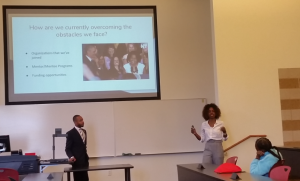On October 18 nearly 350 students from 26 Illinois high schools flocked to Illinois State University to attend the first ISU Future Teacher Conference. The conference, with the purposes of planting seeds of interest in teaching and acclimating students to life on a college campus, is one strategy that continues the long history of engaging and recruiting youth into the teaching profession at ISU.
The ISU Future Teacher Conference began with discussions from various campus and community leaders centered on the prompt “Why Teach.” Shamaine Bertrand, assistant professor of elementary education at ISU, invigorated the crowd by outlining the power and impact teachers have in society. She proclaimed that teaching “is the most rewarding job you’ll ever have.”
College of Education Dean Jim Wolfinger situated ISU as a premiere institute to pursue a career as a teacher. However, Wolfinger sees room for improvement.
“We don’t see the teaching workforce mirroring the demographics of the state, so we’re working on outreach to try and get more students from other backgrounds to come into education,” Wolfinger said.
After the opening remarks, the high school students attended breakout sessions where they explored various education topics such as careers in education, navigating the college process, and gaming and socio-emotional strategies in the classroom. Additionally, there were sessions that directly related to Wolfinger’s remarks on diversifying education at ISU. These sessions included presentations on the strengths of teaching in urban communities and navigating teaching as someone from an underrepresented background.
Cailynn Sturkey, an ISU and National Center for Urban Education (NCUE) affiliated alum, has taught in the Chicago Public School (CPS) system for the last four years. During her session on the strengths of teaching in urban communities, she highlighted the challenging and rewarding aspects of teaching in urban classrooms.

Cailynn Sturkey and Daniel R. Jackson share how they navigated the teaching field as people from underrepresented backgrounds.
Sturkey observed that students in her community face many difficulties in their daily lives. She had to learn to cope with trauma in her classroom, find more culturally relevant curriculum, and deal with issues specific to her own school and community. However, she quickly noticed that urban schools have many misperceptions. She found that in her community everybody holds each other accountable and felt that she had a duty to the whole community. Sturkey attributes the NCUE STEP-UP program as a resource that aided in her decision to teach and thrive in urban communities.
Matthew Miller, another former STEP-UP fellow and current CPS teacher, spoke on how NCUE’s various programs helped him to find his calling as an urban educator. Originally majoring in actuarial science, Miller participated in an urban redesigned course in his undergraduate studies that included an immersive bus trip to Chicago. There, he observed a need for effective STEM teachers and quickly switched his major to math education.
“I was always interested in social justice. I want to do my part and support students,” Miller said.
“I was always interested in social justice. I want to do my part and support students,” Matthew Miller said.
Daniel R. Jackson, an ISU alum and current CPS teacher, stated that as a teacher from an underrepresented background, teachers could combat inequities in society. He believes that it is a teacher’s job to inspire, to listen, and to influence. Jackson continues,
“We make the difference. There is hope,” he said.
It is our mission at as the National Center for Urban Education (NCUE) to cultivate and sustain innovative, resilient, and effective educators for urban schools and their communities. As a center, we view education as a holistic, community-centered endeavor. Recruiting and supporting teachers that come from the neighborhoods we serve is paramount to this vision. Together, teachers like Sturkey, Miller, and Jackson, institutions like Illinois State University, and programs like NCUE are impacting student and whole communities. As Bertrand stated at the beginning of the Future Teacher Conference: “Teachers are powerful.” There is hope.

